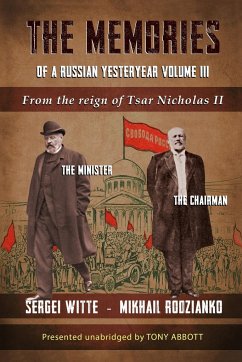First Edition: Trim 6.14" x 9.21" Paperback, Black & White, Cream paper, Matt cover. 600 pages. Within these covers there are two great Public Domain works: Book 1) Sergei Witte served Alexander III with unquestionable loyalty but he did not hold Nicholas II in the same esteem and his frustration grew as he became more and more disillusioned that the autocracy could survive. He believed in preserving the status quo but that reforms were necessary throughout the administrative and social structures in order for Russia to arrive at the twentieth century as a world power and in order to stop the persecution of the minorities, which for the empire meant anyone who wasn't Russian born with Russian roots. In this sense, he might be considered an opponent of Russification, and indeed he was a staunch pacifist who did what he could to prevent and alleviate the suffering of others. Book 2) Mikhail Rodzianko was no less a nobleman that his contemporaries, but his role was essentially in opposition to the autocracy as Chairman of the State Duma. He made numerous attempts to prevent the demise of the monarchy but he was never listened to by the Imperial couple who treated him with contempt. In the end, Rodzianko would ensure the safe transition of the Tsar's abdication which had immediately followed the February Revolution but was unable to protect him and his family from the Bolsheviks, following the October Revolution. Sir Bernard Pares, an English professor of Russian studies, visited Russia for the first time in 1898, when he also met the prominent politician Alexander Guchkov. He returned to Russia during the political crisis of I905, attending the First Duma at the Tauride Palace in 1906, and receiving introductions to Witte, Rodzianko, Rasputin, and many other notables. Pares gave a first hand account of that remarkable span of wars and revolutions. Witte and Rodzianko represent the Government and Duma, and were instrumental in shaping the course of Russian history. In April 1906 Witte was replaced by Stolypin as Prime Minister. An excited Pares returned to St Petersburg that same year to assess the newly formed First Duma. Guchkov, a stalwalt for democracy, became the head of the Octobrists Party in October. Stolypin told Pares that an assembly representing the majority of the population would never work. Pares witnessed the Tsar's persecution policy towards non-Russians. He saw military and political leaders, like Witte and Rodzianko, ostracised from Government, at the instigation of the Tsarina and Rasputin. Hanging on to the only vestige of democracy, in 1909 Pares arranged for a delegation from the Third Duma to visit Great Britain. He became highly critical of the Tsar and his régime after that and became convinced by talks with liberal representatives, that a constitutional monarchy was not only viable but imperative. Pares' role for the Foreign Office as an observer kept him well informed and his opinions were forthcoming; he thought it a serious mistake to appoint Boris Sturmer as Prime Minister in 1916 because he viewed him as a "shallow and dishonest creature, without even the merit of courage." Guchkov, on the other hand, was a former Chairman of the Third Duma and Minister of War in the Provisional Government. If ever there was a chance for Government and Duma to see eye-to-eye it was then, with Guchkov and Rodzianko sharing similar political views; liberals and democrats alike. However, having gone out to accepted the Tsar's abdication, he was mobbed by the crowd who threatened to execute him and he resigned following the public unrest that ensued and his concerns after that was to escape Russia. Both Guchkov and Pares were banned by the communist government from returning to Russia.
Hinweis: Dieser Artikel kann nur an eine deutsche Lieferadresse ausgeliefert werden.
Hinweis: Dieser Artikel kann nur an eine deutsche Lieferadresse ausgeliefert werden.








